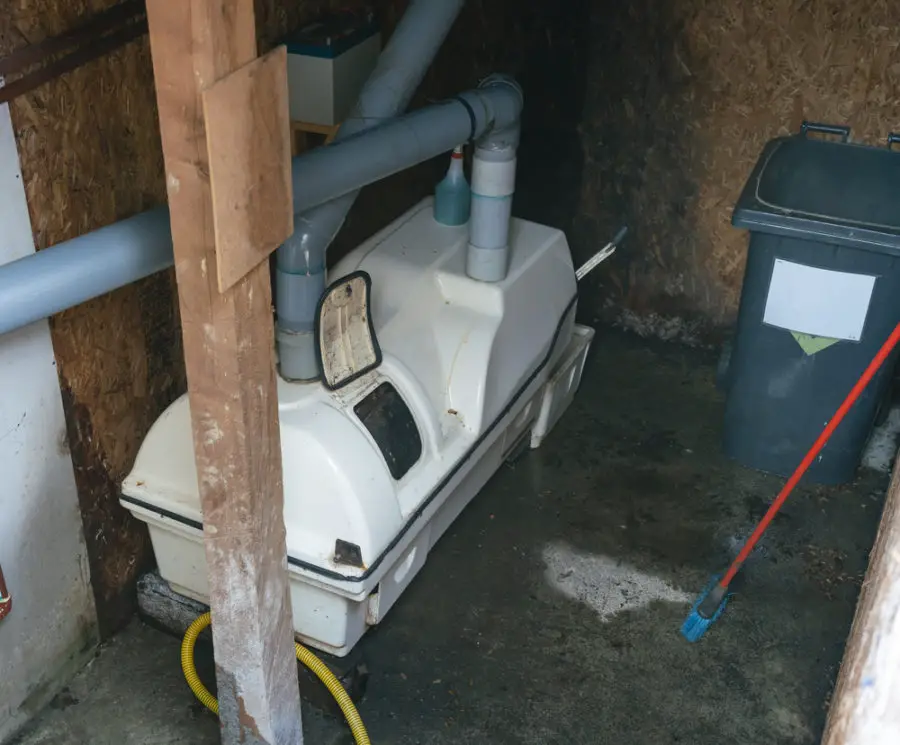On average, it will cost anywhere from $1,500 to $2,000 to install a commercial composting toilet. However, if you have experience with composting toilets and feel confident enough to install them yourself, you can build your own composting toilet for less than $100. This is not recommended, though, unless you have the know-how to build and install the materials on your own.
How Much Does It Cost to Install a Composting Toilet in an RV?
Although you can find some inexpensive RV composting toilets for less than $100, they likely have small tanks that require regular treatment and care. If you have a larger family, you will need something more substantial for your RV.
Larger RV composting toilets will cost anywhere from a couple of hundred dollars to around $1,000. They tend to be more durable than smaller portable options, are made from higher quality materials, and come with all the necessary hardware for installation.
How Much Does It Cost to Install a DIY Composting Toilet?
Rather than paying hundreds or thousands of dollars for a composting toilet, you can build your own self-contained DIY composting toilet using a 5-gallon bucket or a wheelie bin for as little as $10. However, you will have to follow close instructions to guarantee that it is effective and sanitary before you start using it as a toilet.
How Much Does It Cost to Install a Composting Toilet in a Boat?
You can find smaller portable composting toilets for sale online for as low as $100, however, we don’t recommend using a portable composting toilet on a boat. The toilet will not be as stable as a larger installed version and the rocking waves can lead to some unfortunate accidents.
Expect to spend anywhere from $1,000 to $2,000 to install a boat-safe composting toilet.
Can Composting Toilets Be Used in Commercial Buildings?
Yes, composting toilets can be used in commercial buildings and some cities around the nation, including Seattle, have already begun building commercial buildings with composting toilets.
Composting toilets are entirely self-contained so they can be installed just about anywhere without any plumbing. They can be placed in homes, cabins, and even office buildings without any problems.
Do You Need Planning Permission for a Composting Toilet?
For the most part, no you do not need planning permissions to install a composting toilet in your home or office building. That being said, your neighbor will have to give building regulation consent before you can begin the installation.
Some regulations limit where you can place a composting toilet. As long as it is away from living areas and you will not have to carry un-composted through a living area, it is perfectly legal to install a composting toilet with planning permissions.
Are Composting Toilets High Maintenance?
As long as your composting toilet was properly constructed and installed, you will not have to do very much to keep it safe and hygienic. Composting toilets require very little maintenance but you should check it every few weeks for faults and damage. Inspect all sides for cracks and be sure that the seal is tight. If it has come loose, reseal them using tar or epoxy materials.

Do Composting Toilets Stink?
If your composting toilet smells bad, it is not functioning correctly and you should have it inspected. A well-maintained composting toilet should have very little odor at all. In fact, you can even make a composting toilet smell good by adding coffee grinds to it.
Use your daily coffee grinds or get used grinds from a local coffee shop. Add them in whatever quantity smells best to you.
Are Composting Toilets Worth It?
Although they are more expensive to install than a typical toilet, composting toilets are better for the environment and do not require plumbing. In the long run, you’ll save more money by using a composting toilet than you will by using a standard water toilet. You will save money on both your water bill and electricity bill.
Are Composting Toilets Sustainable?
Composting toilets are not only sustainable but they are also far better for the environment than a typical water toilet. Composting toilets require very little water and are not connected to a plumbing system. Best of all, they produce fertilizer that you can use to plant trees, bushes, and vegetables.
Can You Make Your Own Composting Toilet?
Yes, you can build your own composting toilet at home using a 5-gallon bucket or a wheelie bin. This is a cheaper option than purchasing a commercial composting toilet but it does come with a few caveats. You will have to follow some very detailed instructions to build it properly and your local government may frown on its use, depending on where you live.
Can I Put a Composting Toilet in My Garden?
Yes, you can. If you are growing a vegetable or flower garden, you can safely use the composted toilet humus to add more nutrients and microbes to your soil. This will help your plants grow taller and become healthier.
However, if there is any un-composted material left in the toilet, carefully dispose of it at a dumping site or bury it deep in the ground. This material can become toxic if it doesn’t compost fully.
Where Does the Toilet Paper Go in a Composting Toilet?
You can place toilet paper directly into a composting toilet. Over time, it will break down and compost with the rest of the organic material. Some types of paper will compost faster than others, though. Thicker paper will take longer to break down, as will dyed or colored paper. Stick with RV or Marine toilet paper for the best results.
How Long Do Composting Toilets Last?
It depends on the number of people and the type of toilet. A commercial composting toilet used by a typical family will only need emptying every 2 to 3 months. A smaller homemade version will require more maintenance and should be emptied every 2 to 3 weeks.
